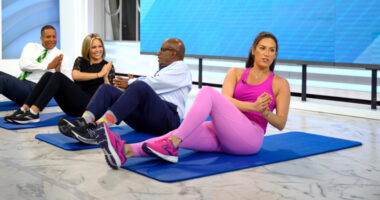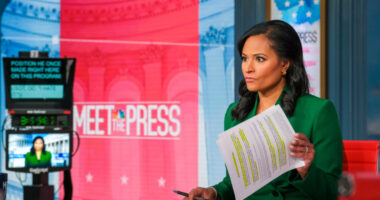
Roger Mudd, the anchorman who delivered the news and narrated documentaries with an urbane edge for three decades on CBS, NBC and PBS and conducted a 1979 interview that undermined the presidential hopes of Senator Edward M. Kennedy, died on Tuesday at his home in McLean, Va. He was 93.
The cause was kidney failure, his son Matthew said.
To anyone who regarded anchors as mere celebrities who read the news, Mr. Mudd was an exception: an experienced reporter who covered Congress and politics and delivered award-winning reports in a smooth mid-Atlantic baritone with erudition, authority and touches of sardonic humor.
He worked for CBS from 1961 to 1980 as a Washington correspondent and weekend anchor and was being groomed to succeed Walter Cronkite on the “CBS Evening News.” When the network named Dan Rather instead, a surprised and disappointed Mr. Mudd resigned.
He then joined NBC as chief Washington correspondent and in 1982 became co-anchor with Tom Brokaw on the “Nightly News,” an attempt to reincarnate the Chet Huntley-David Brinkley chemistry of the 1960s. It failed after 17 months, and NBC made Mr. Brokaw the sole anchor. Mr. Mudd resumed political reporting and documentary work for several years before switching networks again, moving to PBS.
At PBS he reported for “The MacNeil/Lehrer NewsHour” from 1987 to 1992. He then taught at Princeton and at his alma mater, Washington and Lee University in Virginia, and hosted documentaries on the History Channel from 1995 until his retirement in 2005.
Mr. Mudd is perhaps best remembered for the CBS interview with Senator Kennedy on Nov. 4, 1979, days before the senator began his campaign to wrest the Democratic presidential nomination from the incumbent, Jimmy Carter. Mr. Kennedy, heir to the political legacies of his assassinated brothers, had a 2-to-1 lead in the polls when he faced Mr. Mudd and a prime-time national audience.
“Why do you want to be president?” Mr. Mudd began.
Mr. Kennedy hesitated, apparently caught off guard.
“Well, I’m — were I to — to make the, the announcement and to run, the reasons that I would run is because I have a great belief in this country,” he stammered.
It got worse. He twitched and squirmed, conveying self-doubt and flawed preparation, and stumbled through questions for an hour. His campaign, burdened by many problems, including his conduct in the drowning death of a former campaign aide to Senator Robert F. Kennedy on Chappaquiddick Island in Massachusetts in 1969, was wounded before it began and never recovered.
Mr. Mudd, who won a Peabody Award for the interview, also narrated “The Selling of the Pentagon,” a 1971 documentary that exposed a $190 million public relations campaign by the Defense Department that included junkets for industrialists and television propaganda.
Roger Harrison Mudd was born in Washington on Feb. 9, 1928, to John and Irma (Harrison) Mudd. His father was a mapmaker for the U.S. Geological Survey, his mother a nurse. An ancestor was Samuel A. Mudd, a doctor who went to prison for treating John Wilkes Booth for the broken leg he suffered jumping to the stage of Ford’s Theater after shooting Abraham Lincoln in 1865.
After graduating from Woodrow Wilson High School in Washington, Mr. Mudd joined the Army in 1945. He earned a bachelor’s degree at Washington and Lee in 1950 and a master’s degree in history from the University of North Carolina at Chapel Hill in 1953. He began in journalism in 1953 as a reporter for The News Leader of Richmond, Va., and soon became news director of the newspaper’s radio station, WRNL.
Mr. Mudd married Emma Jeanne Spears in 1957; she died in 2011. In addition to his son Matthew, he is survived by two other sons, Daniel and Jonathan; a daughter, Maria Ruth; 14 grandchildren; and two great-grandchildren.
In 1956, Mr. Mudd became a reporter for the Washington radio and television station WTOP, and in 1961 he was hired by CBS to cover Congress. He went on to impress audiences and critics in 1964 with marathon coverage of a 60-day Senate filibuster that delayed civil rights legislation. That led to an assignment to co-anchor, with the veteran journalist Robert Trout, the network’s coverage of the Democratic National Convention in Atlantic City.
Mr. Mudd was a natural on camera: tall and tanned, energetic but relaxed, with a long face that conveyed a rugged imperturbability. As his stature rose at CBS, he became the anchor on weekends and as a fill-in when Mr. Cronkite was on vacation or special assignment. He also covered Senator Robert F. Kennedy’s 1968 presidential campaign, and was on the scene when the senator was assassinated in Los Angeles.
Mr. Mudd won Emmys for covering the shooting of Gov. George Wallace of Alabama in 1972 and the resignation of Vice President Spiro T. Agnew in 1973, and two more for CBS specials on the Watergate scandal. He was named CBS national affairs correspondent in 1977, and became the heir apparent as Mr. Cronkite’s 1981 retirement approached.
But Mr. Rather, the White House and “60 Minutes” correspondent, had sought Mr. Cronkite’s job and threatened to jump to ABC if he did not get it. After CBS chose Mr. Rather, Mr. Mudd went to NBC, where he was expected to succeed John Chancellor as anchor. Instead, the network named Mr. Mudd and Mr. Brokaw co-anchors, one based in Washington and the other in New York, but that arrangement did not last.
Mr. Mudd went on to be an anchor on NBC’s “Meet the Press” in 1984 and ’85 before his move to PBS as a political correspondent and essayist for “The MacNeil/Lehrer NewsHour.” His documentaries on the History Channel included accounts of America’s founders, biblical disasters and the sinking of the Andrea Doria.
Mr. Mudd’s well-received 2008 memoir, “The Place to Be: Washington, CBS and the Glory Days of Television News,” recalled an era of war, assassinations and scandals and news coverage by Eric Sevareid, Harry Reasoner, Marvin Kalb, Daniel Schorr, Ed Bradley and others who shared his spotlight.
In 2010, Mr. Mudd donated $4 million to Washington and Lee University to establish the Roger Mudd Center for the Study of Professional Ethics and to endow a Roger Mudd professorship in ethics.
Alex Traub contributed reporting.
Source: | This article originally belongs to Nytimes.com









